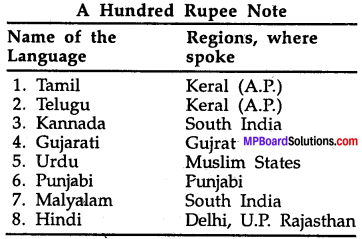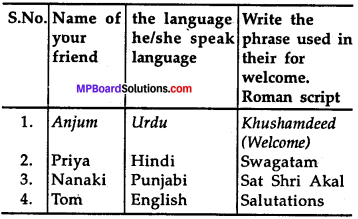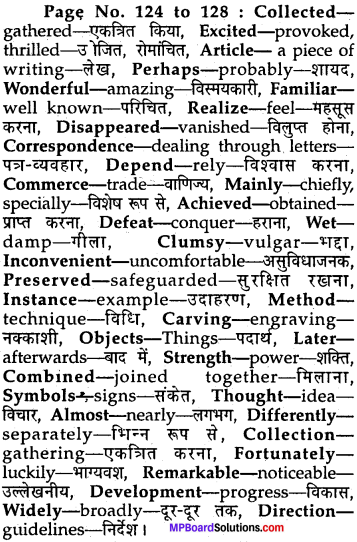Students who feel tough to learn English Chapter 20 The Story of Writing concepts can take help from this MP Board Class 7th Special English Solutions PDF and answer all the questions easily in the exams. Check out the links available here and download textbook solutions for MP Board Class 7th English Solutions. MP Board Solutions for Class 7th English Chapter 20 The Story of Writing Questions and Answers are given to you after sample research and as per the latest edition textbooks. Clarify all your queries and solve different questions to be familiar with the kind of questions appearing in the exam. Thus, you can increase your speed and accuracy in the final exam.
MP Board Class 7th Special English Solutions Chapter 20 The Story of Writing
This can be only possible by reading the passages and topics involved in the MP Board solutions for Class 7th English . All the Solutions are covered as per the latest syllabus guidelines. Practice using these MP Board Class 7th English Chapter 20 The Story of Writing Questions and Answers PDF and test your preparation level and bridge the knowledge gap accordingly.
The Story of Writing Text Book Exercise
Answer these Questions
Question 1.
How would our travel suffer in the absence of writing?
Answer:
In the absence of writing our travel would suffer a great deal. Buses and trains would not run. Ships would not sail and aeroplanes would not fly. There would be no reference books for engineers to enable them to keep the machines in order. Because they cannot retain all the information in their minds.
Question 2.
How does commerce depend upon writing?
Answer:
Commerce in the modern world is carried on mainly with the help of cheques, account books and correspondence. In case the writing disappears, all these would disappear. National and international trade would become impossible and come to stop.
Question 3.
What did the Scythians send to the Persians? What did they want to tell the Persians?
Answer:
The Sycthians sent the Persians a bird, a mouse, a frog and five arrows. They wanted to tell the Persians through these signs that if they could not fly like birds and hide themselves in the earth like mice arid jump over water like frogs, they should not try to go to war with them. They would attack the Persians with arrows and defeat them. They meant to warn them against waging a war.
Question 4.
What does hieroglyphics mean?
Answer:
Hieroglyphics means ‘sacred writing.’ It is a kind of picture writing.
Question 5.
Why is it difficult to learn Chinese?
Answer:
Chinese is a kind of picture writing. The symbols used in it are called pictures or characters. The characters do not represent sounds but ideas. There are characters for every kind of object and for every idea. It is therefore very difficult to learn Chinese because one has to master almost as many characters as one has ideas. Since the number of characters runs to several thousands it takes a long time to learn Chinese.
Question 6.
What is an alphabet? How is it a better system than picture writing?
Answer:
An alphabet is a collection of letters. Each letter stands for a sound of the language. The letters are learnt in a fixed order. Instead of drawing pictures of objects we talk about, this system of writing represents the sounds we use in our speech. As the sounds of any one language are not many, we need not have a large number of symbols. In most languages the letters of the alphabet are never more than fifty. But we can form several hundreds or thousands of words by combining letters. The alphabetic system of writing is therefore far better than picture writing.
Question 7.
In what direction are most languages written?
Answer:
Most languages are written from left to right. However there is no fixed direction of writing. For instance, Urdu and Arabic are written from right to left, Chinese is written vertically and hieroglyphics could be written in all directions.
Question 8.
What, according to the simple servant, was magical about the letter?
Answer:
The simple servant thought that there must be something magical in the letter.
He failed to understand how it could see him eating the mangoes and tell his master’s daughter about it.
Word Power
A. Write one word for the following. Choose from the given words
(alphabets, cheque, commerce, Correspondence, account, direction.)
Example:
The buying and selling of goods and services
Answer:
commerce
- A set of letters used for writing a language
- The general position a person or thing moves or points towards.
- A printed form that you can write on as a way of paying for something.
- An arrangement that somebody has with a bank.
- The letters a person sends or receives.
Answer:
- Alphabets
- direction
- Cheque
- account
- correspondence.
B. Rearrange the letters and make meaningful words.
Example:
l,o,b,m,s,y → symbol
- g,n,i,s → s ………… n
- s, y, c,l,m,u → c ……….. y
- t,s,y,s,m,e → s ………… m
- q,u,e,h,c,e → c …………. e
- e,c,a,v,r → c …………. e
- e,d,a,s,r,c → s ………… d
Answer:
- sign
- clumsy
- system
- cheque
- crave
- sacred
Grammar in Use
A. In the examples given below, notice how the sentences against (1) have been joined in (2) by using ‘not only’, ‘but also’/’as well’.
1. He is a good student. He is also a fine sports person.
Answer:
2. He is not only a good student, but also a fine sports person.
1. This table can be used for writing. It can be used for dinner as well.
Answer:
2. This table can be used not only for\writing but for dinner as well.
1. He speaks French and German. He also speaks many Indian languages.
Answer:
2. Not only does he speak French and Gerpian, but also many Indian languages.
1. Mother gave he children ice cream. She gave them cold drink as well.
Answer:
2. Not only did mother give her children ice cream, but cold drink as well.
B. Now join these sentences as shown in the examples above.
- Jack was very intelligent. He was also hard working.
- He was hungry. He was tired as well.
- It is difficult to lift the stone. It is also difficult to break it.
- The students were tired. The teachers were also tired.
- He works hard at school. He also works hard on his father’s farm.
Answer:
- Jack was not only intelligent, but also hardworking.
- He was not only hungry but also tired.
- It is not only difficult to lift the stone but also to break it.
- Not only the students but the teachers also were tired.
- He works hard not only at school, but also on his father’s farm.
C. Punctuate the following paragraph using .,?”” and capital letters, so we see that in absence of writing.
Our civilization would not only come to a stop but within another half of a century we would lose all that humanity has achieved in science and industry during the past thousand years in about fifty years we would find ourselves as uncivilized as the cave men of the past and we would have to learn the art of writing all over agian.
Answer:
So we see that in absence of writing our civilization would not only come to a stop but within another half of a century we would lose all that humanity has achieved in science and industry during the past thousand years. In about fifty years we would find ourselves as uncivilized as the cave men of the past, and we would have to learn the art of writing, all over again.
Let’s Talk
Sit in groups of four and five. Look at a currency note and talk about its features (marks, figures, shapes, size etc.)
Find answer to these.
- How many languages are there on the currency note?
- How many pictures are there on the currency note?
- How many signatures are there on a currency note?
Answer:
- There are fourteen languages in the currency note.
- There are three pictures on the currency note. Two on the front and one on the back.
- There are two signatures (one in Hindi and one in English) on a currency note.
Let’s Write
Find out what languages are written on a hundred rupee note. Write down the names of the languages and the regions where these are spoken.
Answer:

Complete the table with the help of your teacher.
Let’s Do It
Interview your friends who speak regional languages mentioned above (some or any of them) and write it in the proper column. Use this table for the interview.

The Story of Writing Word Meanings

We hope the data given here will benefit you to the fullest extent at the time of preparation. For better understanding of English subject this MP Board Solutions for Class Class 7th English Chapter 20 The Story of Writing Questions and Answers PDF is the best resource. Download & ace up your preparation. Keep in touch with us and get the latest information on MP board Textbook Solutions PDF.